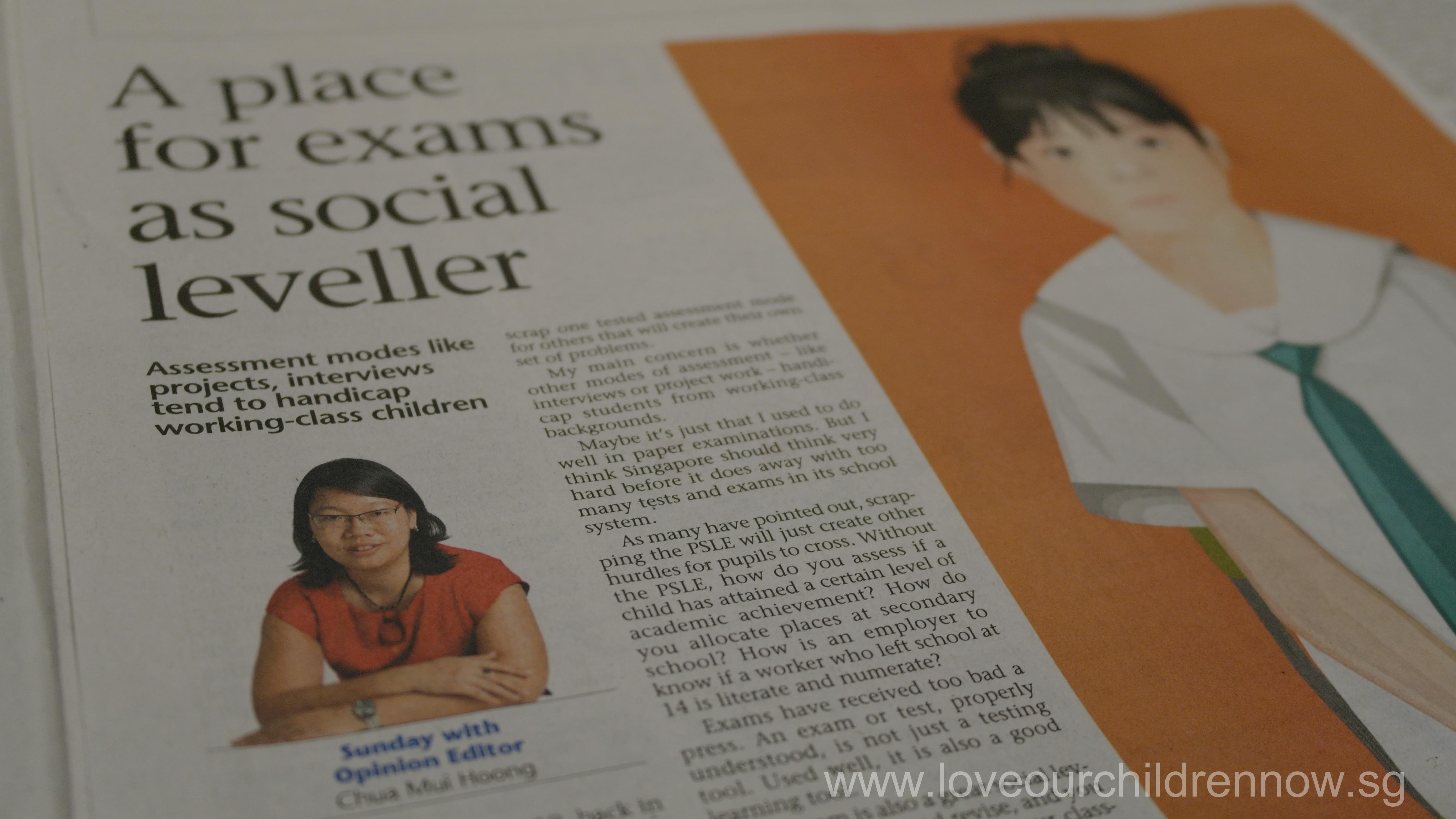PSLE – social leveller
Today I wrote a letter to Chua Mui Hoong, who wrote the excellent article “A place for exams as social leveller” in the Sunday Times.
Instead of writing a full blog post, I shall just re-produce my letter to her:-
“Dear Ms Chua
I really enjoyed your article. So many parts of your article spoke to me.
Firstly, I agree wholeheartedly with you on your overall message, that children with certain background naturally benefit from a certain type of assessment.
Like you, I grew up in a Chinese-speaking home. Unlike you, I never won any scholarship, but some parts of my experience were similar. I did well enough at PSLE to get into a good Convent school. The adjustment was difficult for me. Due to my poor spoken English and less privileged background (my friends’ parents were lawyers and pilots and stayed in landed properties), I was much less confident and was labelled as not “hungry” for success, and disengaged. When I read about your scholarship interview and how you were faulted for not reading the ST, I understand how aggrieved you might have felt. I felt that many times in my secondary school days.
Nonetheless, I did well at my ‘O’ levels. When I did well enough to be offered the Humanities program at College, my classmates were incredulous. I chose not to do it because I did not have the confidence that I was really that good. I benefited socially in Junior College due to my Convent background, although it was only for 4 years. That confidence and self-assurance from that 4 years of so-called “elite” education followed me through my college, university and working years.
In short, the advantage that children from privileged background have, is real, and I experienced the lack of it, and subsequently the existence of the halo effect of a privileged environment, although it was only for a short 4 years.
As such, I agree with your opinion that the national examinations should stay, whatever advantage it also gives to children from privileged background.
I have three sons, the eldest taking his PSLE this year. He is much more privileged than me, although not very much so because we live in a HDB and we do not travel widely – we are among the grassroots. He struggles with Mother Tongue and he is having a fever right now, in the midst of his PSLE. I think that he is a bright boy (he once topped his class and level for Maths and Science respectively), but he is inconsistent in producing good results at examinations. He wants to do well for his PSLE, to get into the school of his choice, but he is an immature child, and is not all the time diligent or careful.
We do not have high hopes for him to do very well, and we can blame it on the school system or PSLE.
However, we accept the outcome, whatever it is. He was not the most hardworking of students and we did not pump in the most amount of money for tuition, nor did we get the most effective tutor for him for all subjects for all his schooling years, so it cannot be said that we have done our utmost to help him, nor that he has put in his best effort for all 6 years.
He will simply reap what we have sowed, though we pray for favour and miracles.
We have chosen to let him have a balanced life, and we are grateful for the education which he received, and the lessons he learnt about life, through spending time in school with teachers and friends.
I appreciate articles like yours, because, to put it bluntly, it introduces some sense into the whole national conversation about PSLE, examinations and the education system.
I think that we tend to get too carried away by how our children fare in their day in court – whether it is the national examinations, a project presentation, or even a piano recital or sports competition. We want our children to succeed all the time, and the truth is, we want to review any system which is not advantageous to our own children.
We can never find a system that will help all the children succeed all the time, and that should not even be the aim. What we need is a system which can help the child discover himself and learn the best way he can. The real test comes when he grows up, and when he faces real life challenges.”


Thanks for dropping by to leave a message.
I constantly worry about the education here in Singapore. I don’t want to put stress on my children, but like you rightly said, I do want to see my children success. How can they not to follow the rigid system but still able to do well and go to school happily? My elder one 4 years old, I still have 2 more years to work out, hopefully…..
I grew up in a 100% chinese speaking family and environment (all people around me). Lucky for me, I didn’t suffer much with my English (though can definitely tell my English is not on par with others). At least I can proudly say I am good at both languages 🙂
a well written reflection.
but the irony is that the definition of ‘less’ privileged background’ is relative. Coming from a dialect speaking family, staying in a one room flat and not having the opportunity to learn piano as you had, i wouldn’t agree that you were from a less privileged background. 😉
Like what you mentioned, in short, the advantage that children from privileged background have, is real, and you experienced it, no doubt, but not from the lack of it, but from having it to your advantage if you had compared yourself to the even lesser privileged.
Hi Teh Oh, thanks for leaving a note. Yes, you are right, it is relative. 一山还有一山高. I am not the least privileged of all (there are those who were orphaned, or were special needs and had no help), but let’s not make it into a competition 🙂
My two main points were, the background of the child does matter, and Human nature is such that we want the scales tipped in our favour.
The other PSLE post which I wrote has a similar idea of us building on whatever family background we have.
http://www.loveourchildrennow.sg/2012/11/22/today-is-my-test/
It has been two years since I wrote about the PSLE, but my struggles with my children’s academic studies remain.
Honestly, I certainly use whatever privileges I have, for my children. I am a stay at home mum, for the benefit of my children (our family can afford it, so we are privileged). I took a course (not cheap) and changed career, so I can teach my dyslexic son. (Not many family had the luxury of that, in terms of finances, and flexibility, and willingness, perhaps). I am now teaching my secondary school sons the languages and arts subjects, and my husband teaches them the sciences (but we started late in the year, so… err.. the results may not bear out). We could do it, because we were university graduates ourselves. In fact, while exploring the homeschool option, I learnt that to obtain the approval to home school, you need to be a graduate (or else MOE trained, or can somehow convince MOE…).
So.. parents’ socioeconomic background, and to some extent, their educational background, do matter – to their school results, especially in a highly competitive system that we have.
However, what I think is most important, is for the parents to be wise, and strategic. I have friends who chose the teaching career, to have the technical skills to be able to help their children, then when the children started formal schooling, they left the teaching service to be SAHM. That is certainly very wise and strategic.